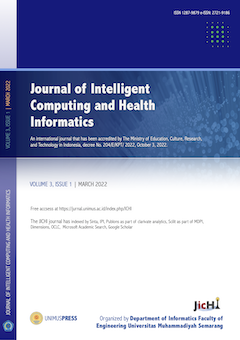A Semantic Ontology-Driven Architecture for Personalized Health Insurance Assignment in Smart Healthcare Ecosystems
(1) Software Engineering, Institut Teknologi Statistika dan Bisnis Muhammadiyah Semarang, Indonesia
(2) School of Allied Health Sciences, San Pedro College, Davao City, Philippines
(3) Liceo de Cagayan University, Cagayan de Oro City, Philippines
(*) Corresponding Author
Abstract
Keywords
Full Text:
PDFReferences
Al-Thawadi, M., Sallabi, F., Awad, M., Shuaib, K., Naqvi, M. R., & Ben Elhadj, H. (2022). A-SHIP: Ontology-Based Adaptive Sustainable Healthcare Insurance Policy. Sustainability, 14(3), 1917. https://doi.org/10.3390/su14031917
Ayams, J. N., Okunlola, F. O., Chimbekujwo, K. I., Taiwo, D. I., Oyewole, O. A., Adetunji, C. O., Adetuyi, B. O., Chinazaekpele, C. C., Adetuyi, T. G., Okunlola, A. R., Olajide, P. A., Adeyemo-Eleyode, V. O., & Olaleye, O. O. (2025). Domain specific semantic categories in biomedical applications. In Mining Biomedical Text, Images and Visual Features for Information Retrieval (pp. 607–634). Elsevier. https://doi.org/10.1016/B978-0-443-15452-2.00029-7
Chatterjee, A., Pahari, N., Prinz, A., & Riegler, M. (2023). AI and semantic ontology for personalized activity eCoaching in healthy lifestyle recommendations: a meta-heuristic approach. BMC Medical Informatics and Decision Making, 23(1), 278. https://doi.org/10.1186/s12911-023-02364-4
Chia Chuan, W., Ul Arfeen Laghari, S., Manickam, S., Ashraf, E., & Karuppayah, S. (2025). Challenges and Opportunities in Fog Computing Scheduling: A Literature Review. IEEE Access, 13, 14702–14726. https://doi.org/10.1109/ACCESS.2024.3525261
Croce, F., Valentini, R., Maranghi, M., Grani, G., Lenzerini, M., & Rosati, R. (2024). Ontology-Based Data Preparation in Healthcare: The Case of the AMD-STITCH Project. SN Computer Science, 5(4), 437. https://doi.org/10.1007/s42979-024-02757-w
Mojeed Dayo Ajegbile, Janet Aderonke Olaboye, Chikwudi Cosmos Maha, Geneva Tamunobarafiri Igwama, & Samira Abdul. (2024). The role of data-driven initiatives in enhancing healthcare delivery and patient retention. World Journal of Biology Pharmacy and Health Sciences, 19(1), 234–242. https://doi.org/10.30574/wjbphs.2024.19.1.0435
Organization, W. H. (2022). WHO guideline on self-care interventions for health and well-being, 2022 revision. In World Health Organization. World Health Organization.
Román-Villarán, E., Alvarez-Romero, C., Martínez-García, A., Escobar-Rodríguez, G. A., García-Lozano, M. J., Barón-Franco, B., Moreno-Gaviño, L., Moreno-Conde, J., Rivas-González, J. A., & Parra-Calderón, C. L. (2022). A Personalized Ontology-Based Decision Support System for Complex Chronic Patients: Retrospective Observational Study. JMIR Formative Research, 6(8), e27990. https://doi.org/10.2196/27990
Sharmila, A. H., & Jaisankar, N. (2021). Edge Intelligent Agent Assisted Hybrid Hierarchical Blockchain for continuous healthcare monitoring & recommendation system in 5G WBAN-IoT. Computer Networks, 200, 108508. https://doi.org/10.1016/j.comnet.2021.108508
Spoladore, D., Colombo, V., Fumagalli, A., Tosi, M., Lorenzini, E. C., & Sacco, M. (2024). An Ontology-Based Decision Support System for Tailored Clinical Nutrition Recommendations for Patients With Chronic Obstructive Pulmonary Disease: Development and Acceptability Study. JMIR Medical Informatics, 12, e50980. https://doi.org/10.2196/50980
Valentini, R., Carrani, E., Torre, M., & Lenzerini, M. (2023). Ontology-Based Data Management in Healthcare: The Case of the Italian Arthroplasty Registry (pp. 88–101). https://doi.org/10.1007/978-3-031-47546-7_7
Article Metrics
Abstract view : 201 timesPDF - 38 times
DOI: https://doi.org/10.26714/jichi.v6i1.17385
Refbacks
- There are currently no refbacks.
____________________________________________________________________________
Journal of Intelligent Computing and Health Informatics (JICHI)
ISSN 2715-6923 (print) | 2721-9186 (online)
Organized by
Department of Informatics
Faculty of Engineering
Universitas Muhammadiyah Semarang
W : https://jurnal.unimus.ac.id/index.php/ICHI
E : jichi.informatika@unimus.ac.id, ahmadilham@unimus.ac.id
This work is licensed under a Creative Commons Attribution-ShareAlike 4.0 International License.








